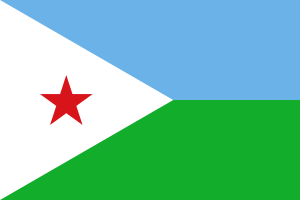Djiboutian

|
|
| Total population | |
|---|---|
| (c. 921,000-935,000) | |
| Languages | |
| Somali, Afar, Arabic | |
| Religion | |
| Islam (94%; Sunni · Sufism), Christianity (6%) |
Djiboutians are native inhabitants of Djibouti and their descendants. Djibouti is a multiethnic and multilingual country.
The two largest ethnic groups in Djibouti are the Somali and Afar. The populations in the French colonial era of Djibouti (1927), Republic of Djibouti (1983 - 2016) were:
Djiboutians culture is primarily rooted in Somali and Afar traditions. They speak different languages Cushitic languages, which are part of the larger Afro-Asiatic (Hamito-Semitic) language family, however, have a way of life same: authentic legendary warriors, they are nomadic pastoralists. However, the population tends to settle because today more than half of its citizens live in the capital and the towns and villages of the interior. Poetry traditionally recited in the villages by special readers called gabaye was a way of recording the community's history and customs, as well as current events.
Djiboutian cuisine is a mixture of Somali, Afar, Yemeni, and French cuisine, with some additional South Asian (especially Indian) culinary influences. Local dishes are commonly prepared using a lot of Middle Eastern spices, ranging from saffron to cinnamon. Spicy dishes come in many variations, from the traditional Fah-fah or "Soupe Djiboutienne" (spicy boiled beef soup), to the yetakelt wet (spicy mixed vegetable stew). Xalwo (pronounced "halwo") or halva is a popular confection eaten during festive occasions, such as Eid celebrations or wedding receptions. Halva is made from sugar, corn starch, cardamom powder, nutmeg powder and ghee. Peanuts are sometimes added to enhance texture and flavor. After meals, homes are traditionally perfumed using incense (cuunsi) or frankincense (lubaan), which is prepared inside an incense burner referred to as a dabqaad.
...
Wikipedia
